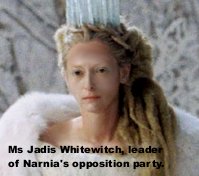
The independent state of Narnia has
stormed out of WTO negotiations in Hong Kong because it is fed up with being bullied by the US and Europe.
Narnia spokeswoman Susan Aslan yesterday stated that Narnia's delegates were tired of bullying by EU and US delegations and would be returning immediately to their state capital at Cair Parvel.
"If this brings the Hong Kong talks to the knees we will be delighted" Ms Aslan stated.
The statement provoked the angry reactions in Cair Parvel last night with Ms Jadis Whitewitch, leader of the pro-US opposition party Winter-For-Narnia claiming the government-led coalition had pulled a political stunt to distract ordinary Narnians from the UN reports of human rights abuses against the indigenous Wolfmonster people of Narnia.
"Not only are the Wolfmonster people still suffering unnoticed, but the delegation has ruined any chance of a US-Narnia free trade agreement being negotiated in 2006," said Ms Whitewitch.
Yes, strange as it seems, there are people whose version of reality is happy to accept this as truth, including some news monitors who work for Forbes and other 'authoritative' business news sites. I thought it was so funny I just had to share it. I even tracked down a cached copy of a real
news story derived from the AFX press release for you! It's also been immortalised in a
printable PDF news release from One World South Asia. I guess the
Yes Men might have been up to their usual tricks.
Anyway, having seen the beautiful CS Lewis story itself translated on to the big screen last night I couldn't help but have a bit of fun to pad the story out myself. It made me wonder why fun alternate versions of reality can provide such amusement, yet be readily dispensed in favour of gritty-sounding news stories from 'authoritative sources'. In fact, before I found cached copies of the AFX release I wondered if Fairfax was playing a joke of its own!
In the end, reality only exists as shared perceptions and the existence of absolute truths/ethics is a myth perpetuated by the need for a certain level of conformity to enusre functional society. Good and evil are concepts which are useful when we are children but tend to lose their usefulness and become inadequate as we enter adulthood. Because life is complex, individual realities diverge as we become more experienced at life. For any individual, his or her personal reality is the sum of all the information they consume, subtly influenced every event he or she experiences.
Individual realities tend to intersect, however, and form clusters of shared reality, whose members see the shared principles and ideas as being immutable due to their widespread acceptance. Thus, where communities form, a particular agreed version of reality tends to emerge. Fewer deviations by individuals occur from the agreed version where the community is more close-knit and less welcoming towards outside influences. Traditionally these communities would form based on geolocation or ethnicity.
The role played by
geolocation in consolidating agreed versions of reality has decreased at a rate perhaps inverse of that at which globalisation has accelerated - which arguably has been ever since Marco Polo began to travel the silk road. Similarly, the role played by
ethnicity in consolidating agreed versions of reality has also decreased in the same way as individual mobility and access to communications media and technologies have increased.
When one person chats or sends message to another on the Internet, however, geolocation and ethnicity have far smaller influence on the reality these people will share than ever before. Of course, each individual is strongly influenced by his or her ethnicity and current geolocation, but these are not necessarily apparent and may be disclosed almost entirely at the discretion of each individual. In fact, pointers such as linguistic competence, symbols contained in username become the de-facto replacements for usual indicators of ethnicity and IP numbers teamed to DNS lookup software become the indicators of geolocation.
The result is that we see some online communities that form without necessarily reflecting existing offline communities oriented towards a particular ethnicity or locality. We see other communities form online which are oriented towards a particular ethnicity or locality, but they are likely to be far less exclusive than their offline counterparts; they are more willing to permit "outside influences" and "outsiders" feel much more able to contribute.
Over the next ten years, I believe we can expect online communities to become less and less concerned with geolocations and ethnicities, and begin to develop firm versions of reality which are shared by people of many ethnicities all over the world.
This may not be particularly utopian, but it will be something new for global society and be unique to the age we're living in.In fact, we are already beginning to see such new communities emerging online with their unique versions of reality. Perhaps the best example would be gaming communities, where the members regularly inhabit a world entirely constructed by themselves or the game creators.
There is a saying that "blood runs thicker than water", based on the assumption that an individual will naturally be more loyal to a family member than a friend or colleague, but perhaps the age of the Internet proves this adage more wrong than ever? Online communities can be expected to earn more loyalty from members than ever in the future, because these members were probably initially attracted to such a community due to
their own innate interests and proclivities rather than via the parents to which — and location in which — they were born.
Perhaps this even means that in the longterm, online communities will homogenise the perceptions of reality around the world, meaning more and more people will share perceptions and understandings, especially on their pet topics, even as the potential range of things to have perceptions about expands.
All of a sudden I'm thinking of John Lennon's
imaginings... But will the world living as one be as nice as the hippies hoped? Might it not be a bit boring?
PS: Apologies that this post is a bit longwinded. I promise I'll sound more lucid when I get over New Year's eve celebrations! Happy 2006 all readers, and I wish you all to go your hardest at creating reality as you envision it could be this year. Love and peace!Technorati Tags: online community, perception, reality, future, Narnia, Tilda Swinton, John Lennon, utopia, WTO
 Still on the Israeli political situation, I note that practically every news article about Sharon is talking about what Sharon achieved and believed instead of achieving and believes. In this light, Uri Avnery has made some very interesting observations on what Sharon's "legacy" is and what it might have been in the Middle East Times.
Still on the Israeli political situation, I note that practically every news article about Sharon is talking about what Sharon achieved and believed instead of achieving and believes. In this light, Uri Avnery has made some very interesting observations on what Sharon's "legacy" is and what it might have been in the Middle East Times.

 The independent state of Narnia has
The independent state of Narnia has 



